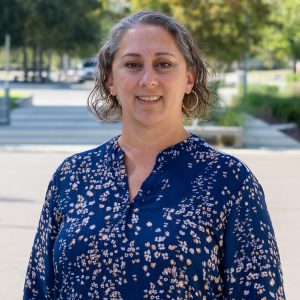Get to know EAP therapist Massiel Snow

Massiel Snow, Psy.D., recently joined the University of Florida as a new Employee Assistance Program, or EAP, therapist. She is a licensed psychologist who has worked with populations across the lifespan in a variety of psychological and educational settings.
What inspired you to pursue a career as a therapist?
Psychology was always a passion beginning in high school. Once I entered the working world, I noticed the great need for mental health services. As a classroom teacher I observed the impact of stressors, personal problems the students were experiencing and how it influenced their behaviors, relationships and their classwork. Additionally, it was the first time I encountered non-suicidal self-injurious behaviors and did not know what to do. The need for counseling and support was also evident with coworkers as personal lives and job-related stressors were taking a toll. I finally made the decision to switch careers after seeing the work the counties’ grief counselors were doing as they joined our schools for several years due to various events.
How would you describe your clinical/therapeutic approach?
I consider myself more “old school,” preferring a person-centered approach, focusing on forming relationships and helping each individual find their box of positive assets.
What can people expect out of a typical session with you?
I like for all who enter to feel comfortable; that we are two individuals sitting down and having a conversation. I am there to listen, support you, as well as challenge you by giving you possible alternative perspectives. Coming to the office is about building you up, reminding you of your personal strengths and the tools you have that you may have forgotten to use and sometimes give you new ones to implement.
Within your work, what are your areas of interest and why?
From grad school, my interests have always been in prevention and protective factors rather than diagnosing. While researching, I became immersed in the principles of positive psychology, which led me on the path I continue to be on today, focusing on learning and teaching patients/clients about self-compassion, self-care and resiliency.
Additionally, grief in all its forms (i.e., disenfranchised grief) continues to be another area of interest. Many times, because of our culture, we are not given the space to understand loss and to learn to cope with it. Because of the nature of the places I worked prior to coming to UF; anxiety, acculturation and trauma, as well as comorbidities were the majority of cases I received. These became areas I continue to focus on while integrating the pillars of positive psychology to each of them. I continue to have many other psychology-related interests including how relationships are built through the attachments we make since infancy. Recently my curiosity has led me to educate myself on post-partum and perinatal mood disturbances and their treatment.
Previously, you’ve worked with a wide range of populations, how have these experiences impacted the way you approach your therapy sessions?
Therapy is about building a relationship which became evident with the variety of populations that came to the office. Having the opportunity to work with these populations made me more sensitive to individual needs and to approach each one as if they were the experts in their experience, and I was the student/observer in the journey. I found it is more important to meet each individual where they are at and tailor each modality/skill to that individual. This is how we show the individual respect, and they feel supported. It is important to see the world from their point of view rather than forcing them to accept my reality as the only true one. I am now more aware of how I inquire about the issues, always mindful to nudge rather than push the individual into finding the “right” solution.
Do you have any self-care tips you could share?
There is a lot of information out there on self-care and well-being. Well-being has many aspects but, in the end, it is about being in a good place with yourself. The best tip I can give is to find any activity you enjoy and find ways to do it on a regular basis. It could be anything from hiking, dancing, cooking, woodwork, reading, gardening, etc. It could be anything that allows creativity, stimulation, of using your imagination, and above all makes you feel good. Self-care is about bringing you relaxation, peace and contentment. Those minutes you spend doing your favorite activity is your own mini vacation where you are recharging, taking a break from the daily pressures. Self-care is not something that is an obligation or a household chore; it is your own little “guilty pleasure” you make time for on a regular basis. Self-care is about making “me time” to continue to improve your well-being. It is up to you what your self-care will look like, just make sure it is an enjoyable activity that puts a smile on your face.
To schedule an appointment with Massiel, visit the UF Employee Assistance Program website. Appointments are available to all faculty, staff, graduate assistants, non-student OPS employees, housestaff/residents and postdoc associates.